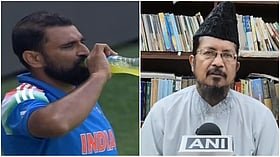Deliberately or otherwise, the president of the All India Muslim Jamaat, Maulana Shahabuddin Razvi Bareilvi, has reignited the debate over what is more important for Muslims in India, their religion or country. Maulana Bareilvi was criticising India’s pacer Mohammed Shami, now playing the Champions Trophy in Dubai, for taking a swig of an energy drink on the cricket field when he should have been fasting or keeping his roza during the ongoing month of Ramzan.
The Maulana is entitled to his views because, after all, so much in every religion lends itself to interpretation and comprehension, but in openly criticising Shami in a video that has now been widely shared on social media and in many groups on messaging platforms, he has re-opened a debate that only stirs passions.
To be sure, Shami has his supporters too. Congress spokesperson Shama Mohammed, among others, came to his defence that Islam permits those who are travelling or unwell to skip the roza. Shami is travelling now for an important tournament. India is in the finals of the Champions Trophy and Shami is seen as a critical cog in the India XI.
However, the other side is more vociferous, and the Maulana’s video has hundreds of comments that call out Shami for being not-a-true Muslim and placing his country above his religion; many gave the example of England’s Moeen Ali, who once batted for hours while keeping his roza. In the ongoing FA Cup, matches are being briefly paused to allow players to break their fast.
How to observe religious prescriptions should, ideally, be a personal decision at all times. Critics have called out Islam itself for being highly prescriptive, leaving little to no room for personal interpretations; even so, if it allows travellers and sick people to skip the roza, there should have been no pressure on Shami to observe the mandatory dawn-to-dusk fast.
This test of loyalty, country first or religion, was what led the Hindutva ideologue Vinayak Damodar Savarkar to assert that Muslims and Christians, even those born here, can never be full or committed citizens of India because their dharma-bhoomi lies outside India.
That line of reasoning, fuelled by designs of some Muslim leaders of undivided India, took the country down a bloody path. The country is well aware of the consequences of that ideology. What is dangerous is that Maulana Bareilvi has, wittingly or otherwise, dragged the debate back to 90 years ago. Shami is an Indian Muslim cricketer. His commitment to either his country or his religion should not be tested; they can and should co-exist.




